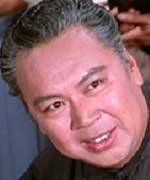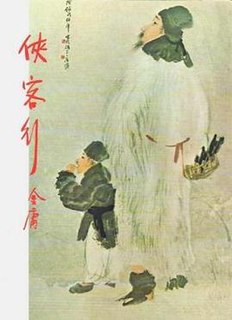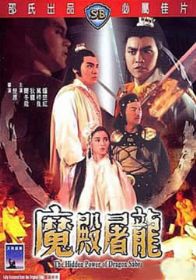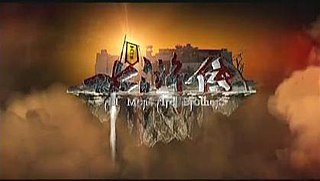
Yuen Woo-ping is a Hong Kong martial arts choreographer and film director who worked in Hong Kong action cinema and later Hollywood films. He is one of the inductees on the Avenue of Stars in Hong Kong. Yuen is also a son of Yuen Siu-tien, a martial arts film actor.

The Return of the Condor Heroes, also called The Giant Eagle and Its Companion, is a wuxia novel by Jin Yong. It is the second part of the Condor Trilogy and was preceded by The Legend of the Condor Heroes and followed by The Heaven Sword and Dragon Saber. It was first serialised between 20 May 1959 and 5 July 1961 in the Hong Kong newspaper Ming Pao.

The Legend of the Condor Heroes is a wuxia novel by Chinese writer Jin Yong. It is the first part of the Condor Trilogy and is followed by The Return of the Condor Heroes and The Heaven Sword and Dragon Saber. It was first serialised between 1 January 1957 and 19 May 1959 in Hong Kong Commercial Daily. Jin Yong revised the novel twice, first in the 1970s and later in the 2000s. The English title is imprecise since neither species of the condor, the Andean condor and Californian condor, is native to China.
Huang Rong is a fictional female protagonist in the wuxia novel The Legend of the Condor Heroes by Jin Yong. She also appears as a supporting character in the sequel, The Return of the Condor Heroes.

The Smiling, Proud Wanderer is a wuxia novel by Jin Yong. It was first serialised in Hong Kong in the newspaper Ming Pao from 20 April 1967 to 12 October 1969. The Chinese title of the novel, Xiao Ao Jiang Hu, literally means to live a carefree life in a mundane world of strife. Alternate English translations of the title include The Wandering Swordsman, Laughing in the Wind, The Peerless Gallant Errant, and The Proud and Gallant Wanderer. Another alternative title, State of Divinity, is used for some of the novel's adaptations.

The Heaven Sword and Dragon Saber, also translated as The Sword and the Knife, is a wuxia novel by Jin Yong. It is the third and final installment in the Condor Trilogy, preceded by The Legend of the Condor Heroes and The Return of the Condor Heroes. It was first serialised from 6 July 1961 to 2 September 1963 in the Hong Kong newspaper Ming Pao.

Lo Wei was a Hong Kong film director and film actor best known for launching the martial arts film careers of both Bruce Lee, in The Big Boss and Fist of Fury, and Jackie Chan, in New Fist of Fury.

Shek Wing-cheung, better known by his stage name Shih Kien, Sek Kin, or Sek Gin or Shek Kin(Chinese: 石堅; pinyin: Shí Jiān; Jyutping: Sek6 Gin1), was a Hong Kong–based Chinese actor. Shih is best known for playing antagonists and villains in several early Hong Kong wuxia and martial arts films that dated back to the black-and-white period, and is most familiar to Western audiences for his portrayal of the primary villain, Han, in the 1973 martial arts film Enter the Dragon, which starred Bruce Lee.

Ode to Gallantry is a wuxia novel by Jin Yong. It was first serialised in Hong Kong from 11 June 1966 to 19 April 1967 in the newspaper Ming Pao. The novel shares the same Chinese title as a poem by the Tang dynasty poet Li Bai, which was used as its epigraph.
The Beggars' Sect is a fictional martial arts sect featured prominently in works of wuxia fiction by writers such as Jin Yong, Gu Long and Wolong Sheng. The sect has also found its way into martial arts films such as King of Beggars. The sect's members are mostly beggars as its name suggests, but some of them are from other walks of life. They are noticeable in public for their dress code and behaviour. The members adhere to a strict code of conduct and maintain the utmost respect for ranks and hierarchy. They uphold justice and help those in need through acts of chivalry. The Beggars' Sect is also one of the supporting pillars in the defence of Han Chinese society from foreign invaders. The sect has a wide network of communications and the members are reputed for their excellent information gathering skills. This is due to the sect's large size and the nature of its members, which allows them to blend into different parts of society easily.

Chinese Paladin is a 2005 Chinese television series adapted from the original version of the Chinese action role-playing game The Legend of Sword and Fairy by Softstar Entertainment. The series was produced by Chinese Entertainment Shanghai and starred cast members from mainland China, Taiwan, Hong Kong and Singapore. It was first broadcast on CTV and CBG in Taiwan and mainland China respectively in January 2005. The drama was hugely popular in China and achieved high ratings of 2.7.

Fox Volant of the Snowy Mountain is a 2006 Hong Kong-Chinese television series adapted from Louis Cha's novels Fox Volant of the Snowy Mountain and The Young Flying Fox. Directed by Andrew Lau and Tam Yau-yip, the series is a co-production by the Hong Kong companies ATV and Ciwen Pictures, with Wong Jing as producer, starring Nie Yuan, Athena Chu, Gillian Chung, Ady An, Alex Fong, Anthony Wong and Patrick Tam. It was first broadcast in Hong Kong on ATV in 2006.

The Hidden Power of the Dragon Sabre is a 1984 Hong Kong wuxia film directed by Chor Yuen and produced by the Shaw Brothers Studio. The film is a spinoff of Louis Cha's novel The Heaven Sword and Dragon Saber.

All Men Are Brothers is a 2011 Chinese television series adapted from Shi Nai'an's 14th century novel Water Margin, one of the Four Great Classical Novels of Chinese literature. The series is directed by Kuk Kwok-leung and features cast members from mainland China, Taiwan and Hong Kong. The series was first broadcast on 8TV in March 2011 in Malaysia.

The Demi-Gods and Semi-Devils is a Chinese television series adapted from Louis Cha's novel Demi-Gods and Semi-Devils. It is produced by the companies Zhejiang Hua Ce Media and Dong Yang Da Qian Media, and directed by Hong Kong television series director Lai Shui-ching. Filming started on 10 November 2012. The series was first aired on Hunan TV on 22 December 2013.
Ng Wai is a former Chinese actress from Hong Kong.
The Legend of Crazy Monk is a Chinese television series about the life of Ji Gong. The series was directed by Lin Tianyi and based on Guo Xiaoting's classical novel Biography of Ji Gong. It was a hot TV series recently in Guangdong Television, Jiangsu Television and Shenzhen Television. It is shown on Mediacorp Channel 8 at 7pm.

Heavenly Sword and Dragon Slaying Sabre is a 2019 Chinese wuxia television series adapted from the novel The Heaven Sword and Dragon Saber by Jin Yong. Originally published in newspapers from 1961 to 1963, the story has been revised twice; once in 1979 and the second in 2005. This remake is primarily based on the third edition of the novel. The series is the first adaptation to be released as a web series and was first broadcast on Tencent in China on February 27, 2019.
Austin Wai Tin-chi was a Hong Kong actor and choreographer. He was the elder brother of actress Kara Wai. He had notable roles in the martial arts films like The 36th Chamber of Shaolin, 5 Superfighters, The Avenging Eagle and Flash Point.














